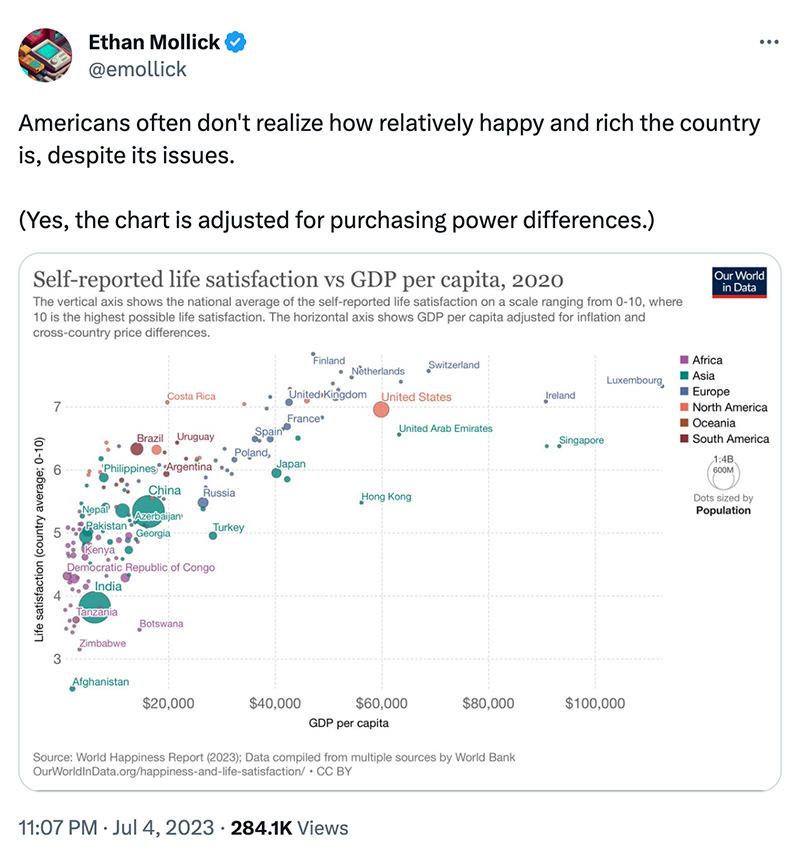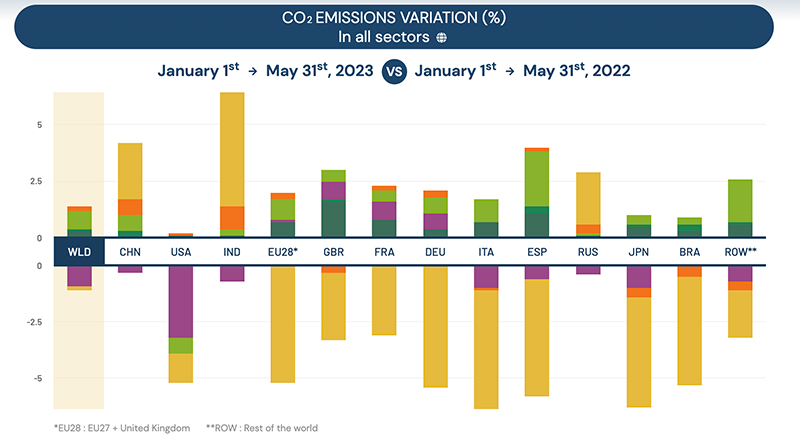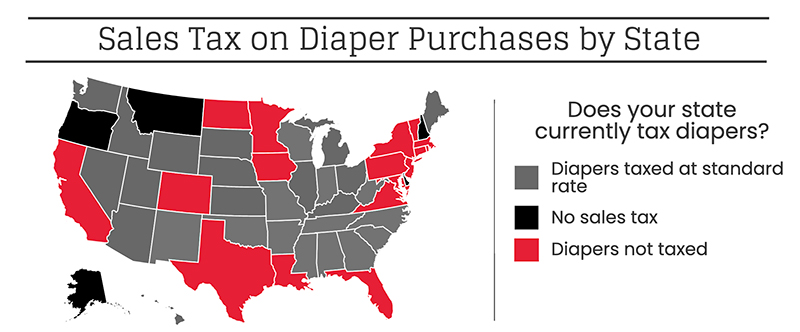Volcanoes are erupting in The Philippines, but on-fire Australia received some welcome rain. The Iran war cries have been called off and The Donald’s military powers are about to be hamstrung by the Senate. Meanwhile, his impeachment trial is starting, and we’re all on Twitter for a front-row seat.
What Could Go Right? America ain’t so bad
Dropping emissions, free diapers, and tiny homes for veterans are just a handful of good things happening in the United States right now.
This is our weekly newsletter, What Could Go Right? Sign up here to receive it in your inbox every Thursday at 6am ET. You can read past issues here.
America ain’t so bad
On a spectrum of how Americans feel about the country, where unmitigated sunniness would lie on one end and utter despair on the other, we seem to frequently land, if not on despair, at least on the worse side of grumpiness. When really in the grand scheme of things we’re doing all right.
We are amongst the highest reporters of life satisfaction, and we have some money to burn, too:

Sometimes we need reminders that there is a lot of positive action going on despite all the noise. In that spirit, while we’re a little late for the Fourth of July, here are a few things that have gone right in the United States recently.
Emissions drop: The US’ emissions are down five percent in the first five months of 2023, compared to the same period in 2022. Taking into account the rest of the world, global emissions were, overall, 0.3 percent higher.

The Jersey shore wind: The Danes are coming to New Jersey to build the US’ largest offshore wind farm, the third offshore wind farm to be approved by the Biden administration. Ocean Wind 1 will provide enough electricity to power 380,000 homes and is even larger than Vineyard Wind, the offshore wind farm currently being built near Martha’s Vineyard, Massachusetts. It is expected to be operational by late 2024 or early 2025. This is what the turbines will look like from the Jersey Shore.
Chemical weapons destroyed: Last week the US finished eliminating its chemical weapons stockpile, an agreement that took effect in 1997 for the US and 192 other countries under the Chemical Weapons Convention. These weapons were rockets carrying what you may know as sarin gas as well as other chemical agents, first used in World War I.
Tiny homes for veterans: Tens of thousands of veterans lack permanent housing. One solution is tiny home villages, communities of “tiny homes” where the houses are under 400 square feet. The House of Representatives is currently considering a bill for a $100 million investment to build more of these communities for veterans, which would include job and financial training as well as mental health support for the residents.

Education evolution: Indiana is one of the last US holdouts where parents at public schools must pay for textbooks and other curricular materials, even iPads. This coming school year, however, will be the first in which Indiana schools will be barred from charging families such fees, after one plucky district in the state set an example.
Pro-family policy gets popular: Nineteen states now exempt diapers from taxation. A substantial chunk of those are new additions, coming in 2022 and 2023 after the rollback of abortion rights, when red states became more open to adopting pro-family policies. (An additional five states don’t charge sales tax at all.)
In Tennessee, Governor Bill Lee has “proposed a program that would cover half the cost of diapers during the first two years of a baby’s life for children on TennCare, Tennessee’s Medicaid program,” reports The 19th.

And pro-birth control: Last week Arizona became the latest state, joining 12 others, where women over 18 years old can obtain birth control without a prescription. The bill passed in 2021 with bipartisan support, and is now in effect.
School safety risk: I appreciated this reminder from The Progress Network (TPN) Member Isaac Saul in response to a reader question in his newsletter that asked whether it’s safe for American parents to send their kids to school, given mass shootings.
“The odds that an American child will die in a mass shooting at a school are roughly 10 million to 1. That is pretty much on par with being killed in an earthquake or struck by lightning,” Saul wrote.
All Americans would like to see mass shootings end. But let’s evaluate their risk sensibly when it comes to making decisions around our children’s education.
Extra reading: Joe Scarborough of Morning Joe celebrates America’s recent achievements (🔒) in a Fourth of July essay for The Atlantic.
Quick hits
- Tweaking agricultural soil to store more carbon could remove 31 gigatonnes of carbon dioxide per year, research says. It would be a significant boost toward reaching climate goals if it can be done.
- Bad information abounds on social media, but so does good information. Meet the (legitimate) OB-GYNs of TikTok, some of whom have millions of followers.
- Twelve African countries will receive 18 million doses of the world’s first malaria vaccine. This will save a lot of lives.
- Aspiring progress intellectuals, here is your chance to sharpen your writing chops and your thinking under the tutelage of big-name advisors. The Roots of Progress, founded by TPN Member Jason Crawford, has just launched its first blog-building intensive. Learn more here.
Correction: Last week’s newsletter on 2023’s animal comebacks confused the beaver population numbers of England with those of Europe. According to the Beaver Trust, there are about 550 beavers in England. There are over a million across Europe.
Below in the links section, the return of the giraffes, helping the blind to see, upending ancient gender roles, and more.

Progress, Please
(Found good news? Tweet at us @progressntwrk or email.)
Other good stuff in the news 🦒
Energy & Environment:
- South America’s largest floating solar farm launched in Colombia | Energy Monitor
- Phosphate rock deposit in Norway big enough to satisfy world demand for fertilizers, solar panels, and EV batteries for 50 years | Euractiv
- IEA says critical minerals supply could pull close to demand by 2030 | Reuters
- Coal-project financing outside of China hits 12-year low | Carbon Brief
- Driven out by decades of conflict, native giraffes make a return to Angola | The Guardian
- Returning giant tortoises are helping recreate the Galapagos islands Darwin saw | Anthropocene
Public Health:
- A long-awaited vaccine for Lyme disease is tantalizingly close | Inverse
- Rural drug courts are embracing medication treatment for addiction | Reasons to Be Cheerful
Science & Tech:
- This new tool will help upend everything we assumed about ancient gender roles | National Geographic
- Gene editing helped crack a 100-year-old mystery about cancer | The Washington Post
- AI could change how blind people see the world | Wired
- New AI translates 5,000-year-old cuneiform tablets instantly | Big Think
Politics & Policy:
- Mobile phones to be banned from Dutch classrooms next year | Reuters
- How Minnesota became the surprising success story of gun reform | The Trace
Economy:
- Biden’s unheralded war on poverty | The American Prospect
- Lamborghini has sold its last fully gas-powered supercar | Insider
- BP backs new fuel for ships made using everyday garbage | Bloomberg
- Renewables help tame Texas electricity costs as heat wave swamps state | Axios
- UK is now the only major economy where inflation is still rising | CNBC
- Most unionized US rail workers now have new sick leave | Reuters
TPN Member originals 🧠
(Who are our Members? Get to know them.)
- Will AI cause ‘explosive’ economic growth? | James Pethokoukis
- Will AI inevitably seek power? | Jason Crawford
- Google isn’t grad school | Arthur C. Brooks
- Two visions of environmentalism | Matthew Yglesias
- In France, nihilistic protest is becoming the norm | Thomas Chatterton Williams
- The same-sex wedding website ruling | Isaac Saul
- Higher education is a super drug | Scott Galloway
- Michael Walzer on liberalism and its critics | Yascha Mounk 🎧
- Declaring war on Mexican cartels is popular. That doesn’t mean it’s smart. | Fareed Zakaria
- The heat records set last week | Isaac Saul
- There is no sixth mass extinction | Emma Varvaloucas
- Why embrace the World Expo? | Penny Abeywardena
- Will capitalism ever change? Never say never | Zachary Karabell 🎧
- What Justice Ketanji Brown Jackson meant when she said ‘blink’ | John McWhorter
Department of Ideas 💡
(A staff recommendation guaranteed to give your brain some food for thought.)
Rage against the machine | The Free Press
Technology is our new god. What would a refusal to worship look like? Paul Kingsnorth offers a vision of resistance.
Why we picked it: Humans default to making additive changes to solve problems, even when making subtractive changes is the more efficient solution. Adopting a personal practice of “tech-asceticism,” as Kingsnorth calls it, is a subtractive change that I think is at least worth considering (and considering often) in relation to AI, social media, smartphones, the internet, and all other new and evolving tech. The opposing view is worth a thought, too, of course. —Brian Leli
Until Next Time
Energy-generating metro turnstiles? Check. 🚇


